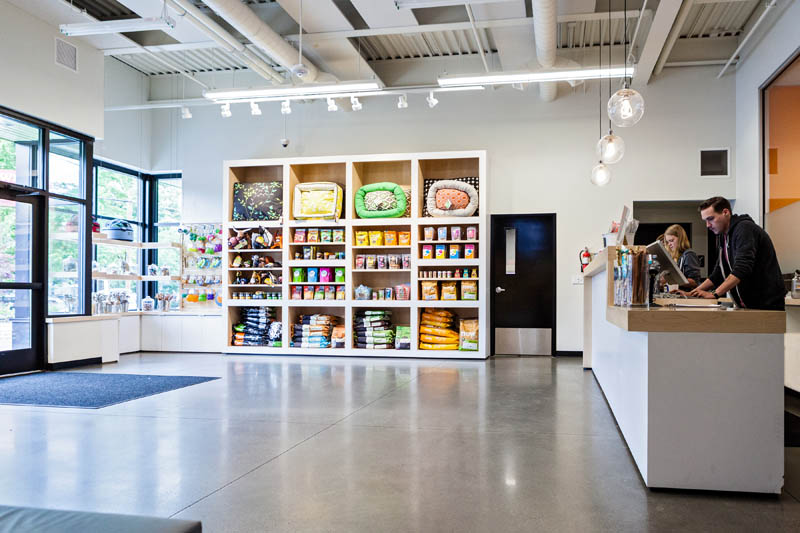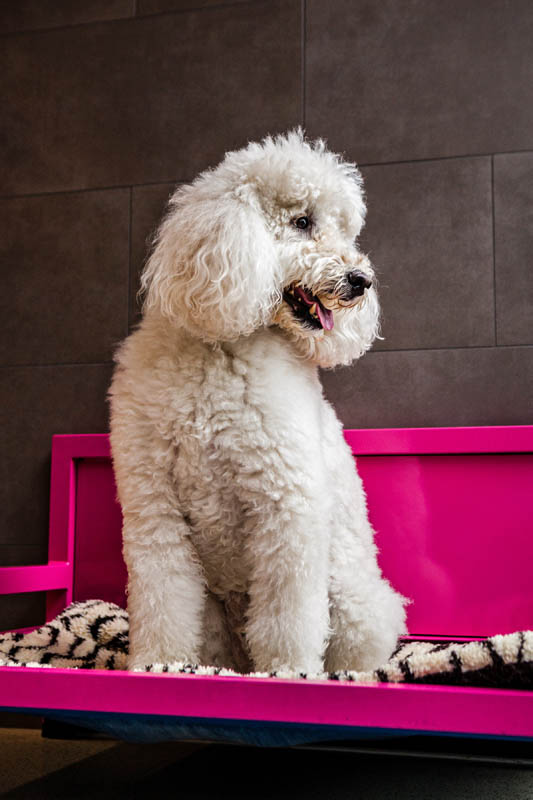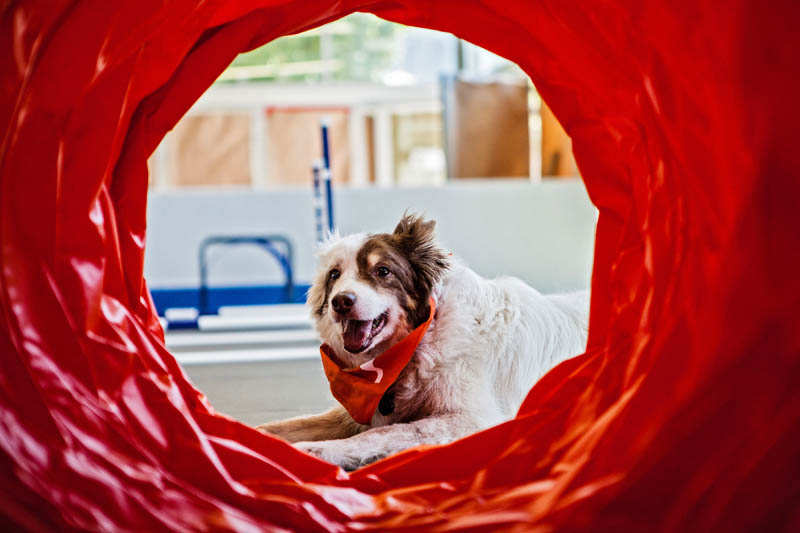BY AMY MILSHTEIN
Pet parents feed the doggy economy.
BY AMY MILSHTEIN | PHOTOS BY JASON KAPLAN
On a drizzly Friday afternoon in Northwest Portland, the large-dog play area inside the Sniff Dog Hotel teems with excitement. Big breeds run, jump, bark and, yes, even go potty on the canine grass drainage system. Upstairs, smaller dogs play in similar spaces while boarding guests lounge in one of 89 rooms and suites, where they enjoy the West Hills view or watch a 24-hour feed of Dog TV. A salon/spa offers services like pedicures, bubble baths and massage, while a retail section stocks toys, collars and other products.
 Visible through a bank of ceiling-high windows in Sniff’s spacious lobby/cafe overspill area, the big guys certainly seem happy. But is that a fair assumption? The idea that animals, specifically dogs, feel emotion took a big leap forward last October, when Emory University professor Gregory Berns wrote an op-ed in The New York Times explaining how he and his colleagues scanned dogs’ cerebral responses in an MRI. They found that the caudate, the part of the human brain that lights up when we experience happiness, also lights up in dogs when they smell familiar people or see their owners. These findings led Berns to posit that not only do canines feel emotions but that dogs are people too.
Visible through a bank of ceiling-high windows in Sniff’s spacious lobby/cafe overspill area, the big guys certainly seem happy. But is that a fair assumption? The idea that animals, specifically dogs, feel emotion took a big leap forward last October, when Emory University professor Gregory Berns wrote an op-ed in The New York Times explaining how he and his colleagues scanned dogs’ cerebral responses in an MRI. They found that the caudate, the part of the human brain that lights up when we experience happiness, also lights up in dogs when they smell familiar people or see their owners. These findings led Berns to posit that not only do canines feel emotions but that dogs are people too.
Granting dogs the rights of “personhood” — as Berns suggested — remains a volatile frontier. Meanwhile, pet parenthood continues to gain a firm footing in our psyche — and our wallets. From Blue Buffalo TV spots that push pet moms and dads to buy expensive food to the last Sunday in April, aka “Pet Parent’s Day,” brought to you by Veterinary Pet Insurance Company, pet parenthood means just owning and caring for your dog isn’t good enough. A pet parent buys the best for furry family members or suffers the shame of middle-class inadequacy.
Like human parenthood, pet parenthood costs big. The American Pet Products Association estimates that U.S. pet expenditures will total $58.51 billion this year, a number that has doubled since 2002. While the APPA doesn’t break down those figures by state, a recent Amazon.com survey ranks Portland fifth in the nation for “pampering their pets” by buying pet-related products and swag. In May Portland also topped NerdWallet.com’s list of best cities in which to own a dog. “Along with a walkable layout, the city has more dog parks per 100,000 residents than anywhere else,” the site explained.
Not just an American phenomenon, the world is in on the action too. Europe, Australia and, more recently, Mexico, China and India expect a rise in pet spending to the tune of $81 billion according to an article on About.com.
Those numbers have people in the dog business panting. “There’s a big opportunity to get rich,” says Katie Brower, 28, who owns Lucid Dog Training with partner Chris Wojda, 38. The former teacher from Wisconsin developed a training system that will eventually be available on the web. She believes this scalable platform will take off on a global level. “Think Kahn Academy,” she says, comparing Lucid Dog to the nonprofit that delivers education on demand through their website. The big difference, of course, is Lucid Dog will charge: “Anywhere from a few hundred to over $1,000, depending on the service,” says Wojda.
Global enterprises aside, most dog-based businesses in Oregon work, and succeed, on the micro level. Doggy daycare, for example, has experienced explosive growth. “When I first started LexiDog 12 years ago, there were three daycares in Portland. Now there are 70,” says Suzanne Hein.
Like others in the dog business, Hein saw a need and followed her heart. The former buyer and merchandiser for Fred Meyer was working 90 hours a week when she fell in love with a tiny puppy, her mini pinscher named Lexi. She took Lexi to an available doggy daycare but wasn’t happy with the situation. “I wanted more of a boutique feeling,” she says, “a place like my friends were taking their kids.”
The First Mother of Portland pet parenthood, Hein launched LexiDog Boutique & Social Club with 5,000 square feet on Southwest Macadam in Portland. Today that space is a 14,000-square-foot headquarters with three satellite locations in Lake Oswego, the Pearl District and her latest in Southeast. She employs 32 people between the four sites and offers daycare, boarding, grooming, swim therapy and birthday parties. Lexi, older, wider, but still tiny, is a constant companion.
 Sniff, back in Northwest Portland, is also growing. The Dog Hotel opened its doors four years ago with 10,000 square feet. As of December, they doubled their square footage to keep up with demand. “We added 30 more suites and expanded our retail section,” says Jamie Mollas, 37, who owns Sniff with her two brothers.
Sniff, back in Northwest Portland, is also growing. The Dog Hotel opened its doors four years ago with 10,000 square feet. As of December, they doubled their square footage to keep up with demand. “We added 30 more suites and expanded our retail section,” says Jamie Mollas, 37, who owns Sniff with her two brothers.
The suites, with their larger footprints, glass-fronted doors and custom-made feeding stations, certainly look more inviting than the Hotel’s standard, no-frills room to human eyes. Costing from $45 to $65 a night, Mollas reports she has no trouble filling them with dogs from the neighborhood, or even as far away as Lake Oswego and Vancouver.
It seems there are enough Portland-area dogs for boarders, groomers and boutique owners to go around. Mud Bay certainly thinks so. The Tumwater, Washington-based chain of specialty pet food stores just opened a store on Northwest Glisan Street in the space previously held by Sony Only.
While Sony continues to struggle to sell their wares, Portland dog parents keep their wallets open. That may be the key to understanding the dog zeitgeist. Pre-recession, people flaunted things to show status: state-of-the-art stereo equipment, designer clothes and gas-guzzling cars. Today that seems shallow: a throwback to the 1987 “greed is good” era. But to spend lavishly on family — well, that’s another matter. Family is real. Family is recession proof. Human family can be hard to come by and complicated to navigate. Dog family: well, that’s simple.
That theory seems to hold true not just for Portland but for the rest of the state, as well. For examples, look to the coast, where the Cannon Beach/Manzanita area lures dogs and dog lovers with numerous pet-friendly restaurants and hotels. Newest in the litter, Dogs Allowed, sits on the south end of North Hemlock Street in Cannon Beach. The 900-square-foot store hit its stride early. Owners Emmas Lindsay, 50, and her husband, Doug Buttermore, 58, don’t have numbers to share, but they do report that since opening in September, only the freak snow days have slowed them down. “I’m having trouble keeping the shelves stocked,” says Lindsay.
Dogs Allowed sells boutique basics sourced as locally as possible: food, toys, treats, collars and leashes. A three-minute walk up Hemlock brings you to Puppy Love by the Sea. Owned by Rose Mays, 62, the shop has weathered many changes in the eight years she’s had the business. Gift and trinket purchases fell with the economy, but toys, leashes and dog-size sweatshirts and raincoats bring in steady sales of $25 to $40 a ticket.
Fifteen miles to the south in Manzanita, Four Paws on the Beach has experienced 50% growth since opening in December 2007. Owners Barbara and Dan Nichols break down their clientele’s demographics as “roughly 40% local, 25% second-home owners and 35% tourists.” The biggest inventory change Nichols remembers is the post-recession drop in luxury items, like Italian leather harnesses and collars.
The days of $125 cashmere sweaters and $325 Donald J. Pliner leather jackets (like the one owned by Hein’s dog, Lexi) may be gone, but the opportunity to outfit our dogs in our image lives on. Pet parents want to include their children — or, in Lindsay’s words her “dogter” — in every aspect of their lives. For what is parenthood but the opportunity to share one’s activities, lifestyle and even ethics?
For the outdoorsy pet parent, 22-year-old Ruffwear is a veritable REI for dogs, offering lifejackets, hydration packs, camp beds and hiking boots. The Bend-based company sells their products in more than 40 countries and has enjoyed double digit growth from 2003 to 2008. After some slowing, business picked up again in 2013. Ruffwear recently moved to a 21,000-square-foot building to house 25 employees and their distribution center. Their products are sold at specialty boutiques or directly to consumers from their website. Average web sales total $82.
 Want to take your dog to a disco? Check out the Zoom Room, which opened in Portland in June with another slated to open Westside later this year. The national franchise of dog gyms offers training, socializing and parties. But not just any party; Zoom Room sells Doggy Disco parties with your choice of music and laser light show — doggy ecstasy not included. Mark Van Wye, COO, explains Zoom Room’s appeal in a brief email: “I think that Zoom Room really taps into something that people want to be involved in. It’s a feel-good business, and people (and their dogs) leave the gym with a smile on their face.”
Want to take your dog to a disco? Check out the Zoom Room, which opened in Portland in June with another slated to open Westside later this year. The national franchise of dog gyms offers training, socializing and parties. But not just any party; Zoom Room sells Doggy Disco parties with your choice of music and laser light show — doggy ecstasy not included. Mark Van Wye, COO, explains Zoom Room’s appeal in a brief email: “I think that Zoom Room really taps into something that people want to be involved in. It’s a feel-good business, and people (and their dogs) leave the gym with a smile on their face.”
Or perhaps you’re a family of recyclers. Good news: With nine full-time employees, Cycle Dog reads like the perfect Portland business. With collars, leashes, leads and toys created out of repurposed bike inner tubes, the company has grown 200% to 300% each year since opening in 2009. Today they have 5,000 square feet of manufacturing and a new factory store. “I’m amazed at the response,” says Cycle Dog president and owner Lanette Fidrych. She’s presently expanding her offerings to include travel bowls, treats and corn-based plastic waste bags, all with the Cycle Dog logo. Treats, toys and collars retail between $8 and $25.
Cycle Dog products are available in Canada, parts of Europe and Australia, but Fidrych, a former Nike product manager, says the Northwest remains her biggest market. She may have found the sweet spot for dog products. Bicycling, recycling and, in the case of Northwest buyers, shopping local come together under the umbrella of pet parenthood.
There’s even room for the little guy to compete. Joslin Larson, 45, was a hairdresser when a back injury sidelined her career. She came up with the idea of a chew-resistant, indestructible leash and lead, and has been hand-making them in Redmond since 2006. Her cash-based business grew slowly compared to the rest of the industry, but she is about to hire two part-time employees. “I have a niche business, so I want to grow smart,” she says. Her product is carried by Mud Bay, but she mostly sells on Amazon.
Not everyone in the dog business is raking it in. Dogstew, a company founded by Portland-based Rick Woodford, aka “The Dog Food Dude,” shows that it takes more than a great, or even popular, idea to succeed. Woodford started cooking for his sick dog, Jackson, and noticed his health improving. He then started cooking for other dogs.
“Initially, I couldn’t believe that people would pay for my product,” he says. Priced frm $2.50 to $7.00 a day, the handmade, locally sourced dog food was snapped up by food-savvy owners. At the height of his operation in 2007, 120 Portland-area dogs were eating Dogstew, with Wooford shopping, cooking, portioning and delivering the product all on his own. Regulations forced him into a commercial kitchen, which he then upgraded to animal-feed codes.
Still, it wasn’t enough to remain profitable. Woodford closed up shop in March 2008 and went back to his day job, as an analyst at Adidas. He wrote Feed Your Best Friend Better, a dog-food cookbook that numbers between 43rd and 65th in popularity among pet books on Amazon.com. Today Woodford consults with other dog food startups and dreams about getting back in the business.
Who can blame him? People in this industry are often personally invested in their products or services, from Woodford’s sick pup to Larson’s early childhood trauma of watching her beloved dog chew through her leash and get hit by a car. We’ve always loved our pets, and that love crosses the urban/rural line. Sniff’s Mollas grew up on a farm where pets were “treated as pets,” not people. But even then, she acknowledges, there was always a “connection between us.”
Fred McCaulou, the owner of Sisters Feed & Supply, banks on that connection. True, most of his customers are vacation homeowners primed and ready to spend on the specialty pet feed items he stocks. But even at Redmond’s Central Oregon Ranch Supply, where the top sellers are vaccines and grain, dog supplies are big business. “We’ve always carried feed and accessories,” reports Rita McFarlane, who’s worked there for 37 years. “Now we carry more.”
So yes, we love our dogs. Can we love them too much? Monique Udell, an assistant professor of Animal and Rangeland Sciences at Oregon State University, thinks we may be walking that line. “There’s a lot of social pressure to treat dogs as members of the family, but that impacts their behavior,” she says. Udell is horrified to see fully clothed dogs being pushed in strollers but comments that even seemingly benign behavior can have a negative impact.
“When we lavish attention on our dogs, we are setting them up for separation anxiety and the behavior that comes with it,” she says of the destructive chewing, scratching and biting that often lead pet owners to easy fixes like antidepressants. She advises us to remember that three-quarters of all dogs in the world live as scavengers. They’re not strays but wild dogs that live alone or in groups — and do just fine.
Yet she knows she’s being a bit hypocritical, as her dog, Ember, sits next to her during the interview. “We want love from our dogs, so we give them attention,” Udell says. “But dogs should be allowed to behave like dogs.”
Good luck with that. We’ve turned the corner on what it means, and how much it costs, to have a dog. Whether you self-identify as a pet parent, pet guardian or (gasp) pet owner, the reasons we dote on our dogs prove complex. Perhaps, as we live busier, more urban and more plugged-in lives, we seek a direct connection to nature, albeit on our terms. Maybe the complicated realities of the financial crisis, income inequality and other unsettling events can be soothed by the balm of doggy kisses. Maybe we have an innate need to nurture, and dogs are the perfect recipient: present, willing and eternally grateful.
Whatever the reason, this devotion is great news for Oregon’s dog businesses. But can it be too good? The big players like Target, Walmart and Fred Meyer have taken notice and are offering specialty feed and toys, which has the niche players a little nervous. Signs of saturation are subtle. LexiDog’s Hein remembers breaking even in the first three months of opening her flagship boutique. Each location has taken longer and longer to reach that milestone. She expects her newest Southeast Portland spot won’t be in the black for 18 months. “We’re hoping for new puppies,” she says, “but the competition is tough.”
{artsexylightbox singleImage=”images/stories/articles/archive/july2014/dog-slideshow/dog-leader.jpg” path=”images/stories/articles/archive/july2014/dog-slideshow/”}{/artsexylightbox}


